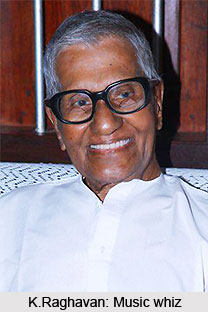 K. Raghavan is the Malayalam music composer who offered a new direction and identity to the domain of Indian Malayalam music. In a career straddling over four decades he has scored melodies for more than sixty Malayalam Cinema and many of his compositions has remained evergreen basking in the glory of evergreen musical pastures of Malyalam.
Music Director K.Raghavan is well known as `Raghavan Master` who is still living still at his home town `Tellicherry`(Thalassery) young and fresh at the age of 98.
K. Raghavan is the Malayalam music composer who offered a new direction and identity to the domain of Indian Malayalam music. In a career straddling over four decades he has scored melodies for more than sixty Malayalam Cinema and many of his compositions has remained evergreen basking in the glory of evergreen musical pastures of Malyalam.
Music Director K.Raghavan is well known as `Raghavan Master` who is still living still at his home town `Tellicherry`(Thalassery) young and fresh at the age of 98.
Early Life of K. Raghavan
K. Raghavan was born to parents Krishnan and Narayani at Talasseri. His mother died when he was still accounted as juvenile. His father tied the nuptial knot again. The family was clouded by climate of poverty and the atmosphere was unpromising without any hope of financial resurrection. His father used to sing Folk Songs during functions in their community and later Raghavan also joined him for singing songs which he enjoyed very much. He got trained in Hindustani Classical Music and got trained to play some musical instruments also.
It was after his school period came to halt that his maternal uncle took him to Mumbai to find him a job but after a few months he returned back and went to Chennai to seek a job related to music. Soon he got employment at `All India Radio Station Chennai` as player of Musical instrument `Thamburu`. Even though the salary was less he managed to get along because he could earn some money by giving musical lessons to children nearby. After a few years he was transferred to New Delhi Radio Station and in 1950 he was sent to `Kozkikode` Radio Station. At Kozhikode Station he got acquaintance with intellectual personalities like P.Bhaskaran, and Uroob.P.Bhaskaran was a well known poet and song writer even during those days and Uroob (P.C.Kuttykrishnan) was a famous novelist.
Career of K. Raghavan
The Malayalam film `Neelakkuyil` was a trendsetter during the first phase of Malayalam cinema history. It was made in 1953 and released in 1954.Up to that period the songs of Malayalam films copied or imitated famous Hindi film tunes but the original Kerala style tunes with a folklore touch was one highlight of `Nelakkuyil` which was well appreciated by the audience. Those songs were composed by K.Raghavan and his fame was spread all over Kerala instantly with that film. The lyrics were written by P.Bhaskaran and K.Raghavan used the most appropriate tunes well suited for the story and also the situation of the sequences. Raghavan infused the folk element into Malayalam film music and his rustic melodies replaced the then prevailing trend of imitations of popular Hindi tunes of the day.
It was a film which had the theme intended to change the mentality of the people about the caste system prevailed in the State. The need to implement social justice was said nicely by the Directors Ramu Kariat and P.Bhaskaran.It was the first Malayalam film which employed outdoor shooting. The film earned much accolades, National Film Award etc. The songs of that film are still very popular and seem they will remain eternal for ever. One of the songs in `Neelakkuyil` was sung by K.Raghavan itself and that song was also well accepted.
As part of the job K.Raghavan had to compose music for songs which he used to perform fantastically well which impressed P.Bhaskaran etc. Thus when P.Bhaskaran planned to direct the film `Neelakkuyil` along with `Ramu Kariyat` they handed over the music direction work to K.Raghavan.As in the versus "Engane nee marakkum kuyile engane nee marakkum" Malayali people can not forget the sweet melodious songs of that film. K.Raghavan Master proved that when excellent lyrics are composed with perfection and well suited tunes brilliantly, they will remain eternal for ever.
For composing music for films and Professional dramas K.Raghavan had to get permission from the authorities of All India Radio and the formalities took around two months. Only the Producers and Directors willing to wait long were able to call him for film works. So in his career he composed music for around sixty films only but the number of film songs is around 400.He composed music for several dramas of K.P.A.C also. The drama songs "Pambukalkku Malamundu Paravakalkkakasamundu" and "Thalakku meethe soonyakasam thazhe maru bhoomi" are examples for K.Raghavan Master`s magical touch.
He utilized singers Brahmanandan, K.P.Udayabhanu, V.T.Murali, Santha P.Nair, Gayatri Srikrishnan etc. along with other famous singers. Age and ailments have not doused the creativity of the composer whose last composition was for Shashinaz. The songs in Kadamba in which he sang `Appozhum paranjile...` written by Thikkodiayan also proved that the octogenarian singer in him is still vibrant.




